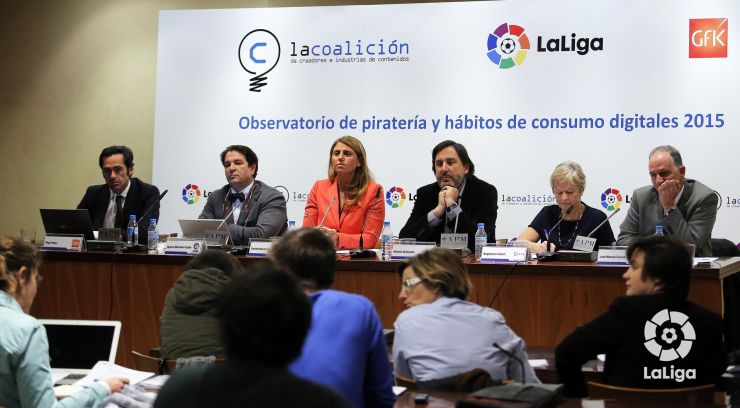Nota de Prensa
JUE 31.03.2016
Digital piracy keeps beating records in Spain, causing enormous damage to creators, and the cultural and digital content industries: in the past year 87.94% of content consumed was illegal. During 2015, only 36% of all content consumed was legal, four per cent less than the previous year, and the percentage of consumers that illegally accessed content on the Internet rose to 63%, from the previous high of 58% recorded in 2014. These are some of the key results gathered by the 2015 Report into Piracy and Digital Content Consumption Habits, carried out by independent consultant GfK and released this Thursday by the Coalition of Creators and Content Industries, and LaLiga.
"The situation demonstrates that the measures taken by the government have been insufficient and that there is a pressing need to apply the current legislation more effectively," argued Carlota Navarrete, the director of the Coalition. Meanwhile, Ignacio Martinez Trujillo, LaLiga's managing director of innovation and global development, stated that, "We have to safeguard our revenue to be more competitive and that means we need to carry on working on the matter of digital environments." The LaLiga executive voiced his concern over piracy, while nevertheless venturing that, "In the football industry, the fight against piracy is on the right track." On this note, Trujillo added that, "the popularity of pay TV is on the rise in Spain, which in turn reduces piracy."
ATTITUDES, ILLEGAL ACCESS AND LOSS OF POTENTIAL EARNINGS
During 2015, a total of 4.3 billion pieces of digital content were accessed illegally, with a market value of 24 billion euros. The total losses to piracy were 1.7 billion euros, with the following breakdown: music (20%), films (37%), videogames (14%), books (15%), TV series (30%), and football (11%).
There has been a significant rise in the numebre of interviewees stating: "I’m not harming anybody" or "there are no legal consequences for those who pirate, nothing happens", an attitude adopted in 2015 by 29% and 26% of users respectively, compared to 19% in 2014.
ACCESS CHANNELS AND SOURCES OF INCOME
There has been a considerable increase in the use of search engines to access illegal content, from 72% to 81%, with Google as the engine used by nine out of ten people who access pirated content. More than 74% of webs from which illegal content was accessed are financed by advertising (compared to 71% in 2014).
It's remakable that more than one third of publicity on pirate sites belongs to well-known consumer brands from the food, fashion, insurance and communications industries, which confirms the urgent need for greater collaboration between the industry and the advertisers to improve the ecosystem of online advertising.
IMPACT ON EMPLOYMENT AND STATE INCOMES
The impact of piracy on employment provides even most disturbing figures for creators and the cultural and content industries. In a sector that directly employs 58,557 people, a scenario without piracy would enable the creation of 21,672 new jobs directly, a 37% increase, and one hundred thousand indirect jobs.
The public coffers were denied 337 million euros in VAT as a consequence of piracy, as well as 162 million euros in social security contributions, and almost 48 million euros in personal income tax. That is to say, in 2015 the State lost a total of 547 million euros as a consequence of illegal access to content.
EFFICIENCT ACTION
The most efficient measures against piracy would be, according to internet users themselves, blocking access to the websites offering content (65%) and promoting social awareness campaigns (52%). Following those two, according to consumers, the best measures to reduce infringements would be imposing penalties on Internet access providers and operators (58%), as well as on direct users, either with fines (49%) or by restricting the use of Internet (40%).
More information here: Piracy observatory and digital contents consumption habits 2015
© LALIGA - 2016


